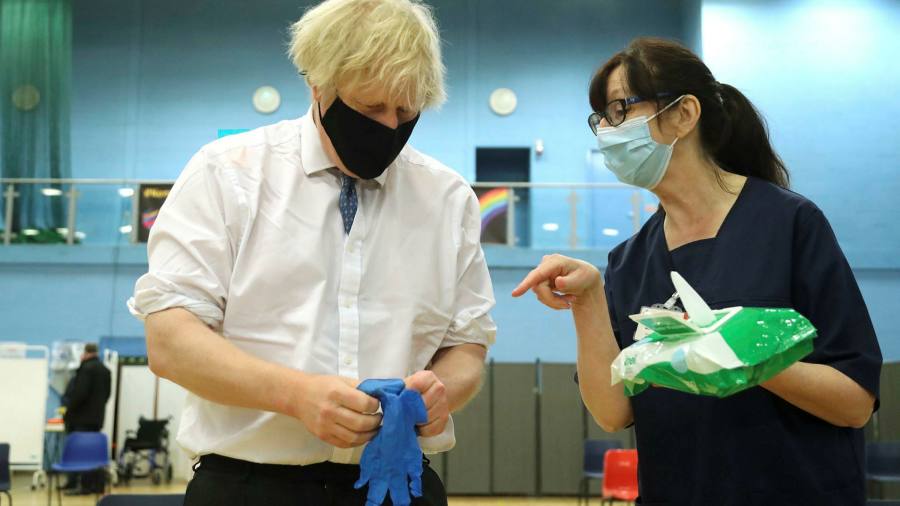[ad_1]
Leading scientists on Wednesday urged the government to be led by data rather than dates, ahead of Boris Johnson’s announcement on lifting coronavirus lockdown restrictions next week.Â
Professor Angela McLean, chief scientific adviser at the Ministry of Defence, told MPs on the science and technology committee that vaccine rollout was a cause for optimism, but added that it was important to take a cautious approach to removing measures.
“Let’s use data not dates,†she said. “The important thing is to watch what is happening in the real world and do our best to make judgments properly in real time about whether we are going too fast or need to pause before taking the next step.â€Â
The prime minister has said he will announce a “road map†for lifting restrictions on February 22, with schools expected to be the first to reopen from March 8.Â
Speaking during a visit to a vaccination centre in south Wales on Wednesday, Johnson stressed that the government would be adopting a “prudent†approach to removing coronavirus measures.Â
“We’ll be setting out what we can on Monday about the way ahead and it’ll be based firmly on a cautious and prudent approach to coming out of lockdown in such a way to be irreversible,†he said. “We want to be going one way from now on, based on the incredible vaccination rollout that you’re seeing in Cwmbran.â€
Mark Woolhouse, professor at Edinburgh university and a member of the government’s Scientific Pandemic Influenza Group on Modelling, told MPs on the science committee that the vaccine rollout was “exceeding expectationsâ€.
“The actual performance of the vaccine, the transmission blocking potential is key but so of course is its actual ability to protect against death and disease and keep people out of hospital . . . all those numbers are looking really good,†he said.Â
He also argued that the government may be in a position to lift restrictions earlier than planned, adding: “If you’re driven by data and not the dates, right now you should be looking at early unlocking because the data are so good.â€
Nicola Sturgeon, Scotland’s first minister, also gave an upbeat assessment of the effect of vaccines on Wednesday, telling the Scottish parliament: “It strongly suggests the vaccine programme is having the hoped for effect in reducing the death toll of the virus.â€
However, back in London, McLean warned the members of the science committee that information relating to the impact of vaccines on transmission was still unclear. “The number one thing we don’t know about vaccines still is this issue of how infectious you are if you catch Covid even if you have been vaccinated,†she said.
She also noted that some within the scientific community were concerned that even with vaccines, herd immunity may not be reached and warned of the risks of additional waves spreading among the unvaccinated.
“A wave among the unvaccinated could be very, very bad,†she said. “And as we all know there are certain groups in society who are particularly hesitant to take the vaccine and some of those groups are groups that we know seem to suffer disproportionately severe disease when infected.
“I think we can say very clearly don’t unlock too fast because if you unlock a lot while a lot of the most vulnerable are still unvaccinated, genuinely — we risk disaster.â€
Vaccine rollout timetable
December 8 2020
90-year-old Margaret Keenan becomes the first person in the world to receive the BioNTech/Pfizer vaccine. The vaccine is approved by the UK’s medicines regulator, the MHRA, on December 2.
January 4 2021
82-year-old Brian Pinker becomes the first person to receive the Oxford/AstraZeneca Covid-19 vaccine. The UK government has ordered 100m doses of the vaccine, which can be stored at a normal fridge temperature. The vaccine was approved for use within the UKÂ by the MHRA on December 30.
January 4 2021
Boris Johnson outlines the government’s plan to offer the vaccination to the estimated 14.6m people in the four top priority groups identified by the Joint Committee on Vaccination and Immunisation — these include all people aged over 70 plus frontline health and social care workers and the clinically extremely vulnerable.
February 1 2021
The NHS announces that it has offered the vaccine to all eligible care homes with older residents throughout England.
February 3 2021
UK passes a milestone of 10m vaccinations administered.
February 12 2021
Welsh government announces that it has offered the first doses of the vaccine to the top four priority groups as outlined by the JCVI.
February 14 2021
Prime minister Boris Johnson announces that the UK has vaccinated just over 15m people, while all individuals within the top four priority groups in England have now been offered their first dose of the vaccine.
February 15 2021
NHS begins vaccinating individuals aged between 65 and 69 and the clinically vulnerable.
[ad_2]
Source link






